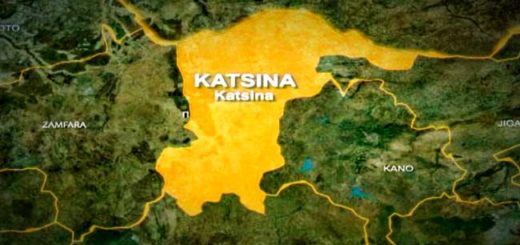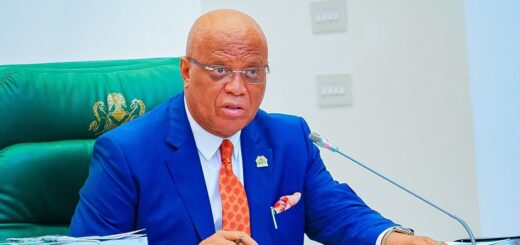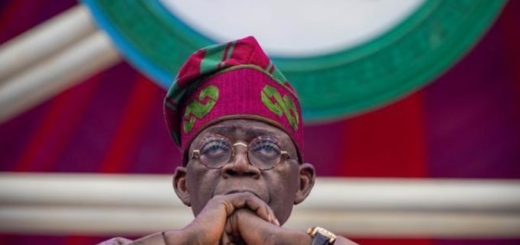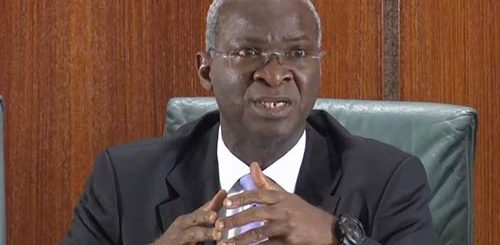2024 Fiscal Year: Security Gets Lion’s Share As Tinubu Presents N27.5trn Budget
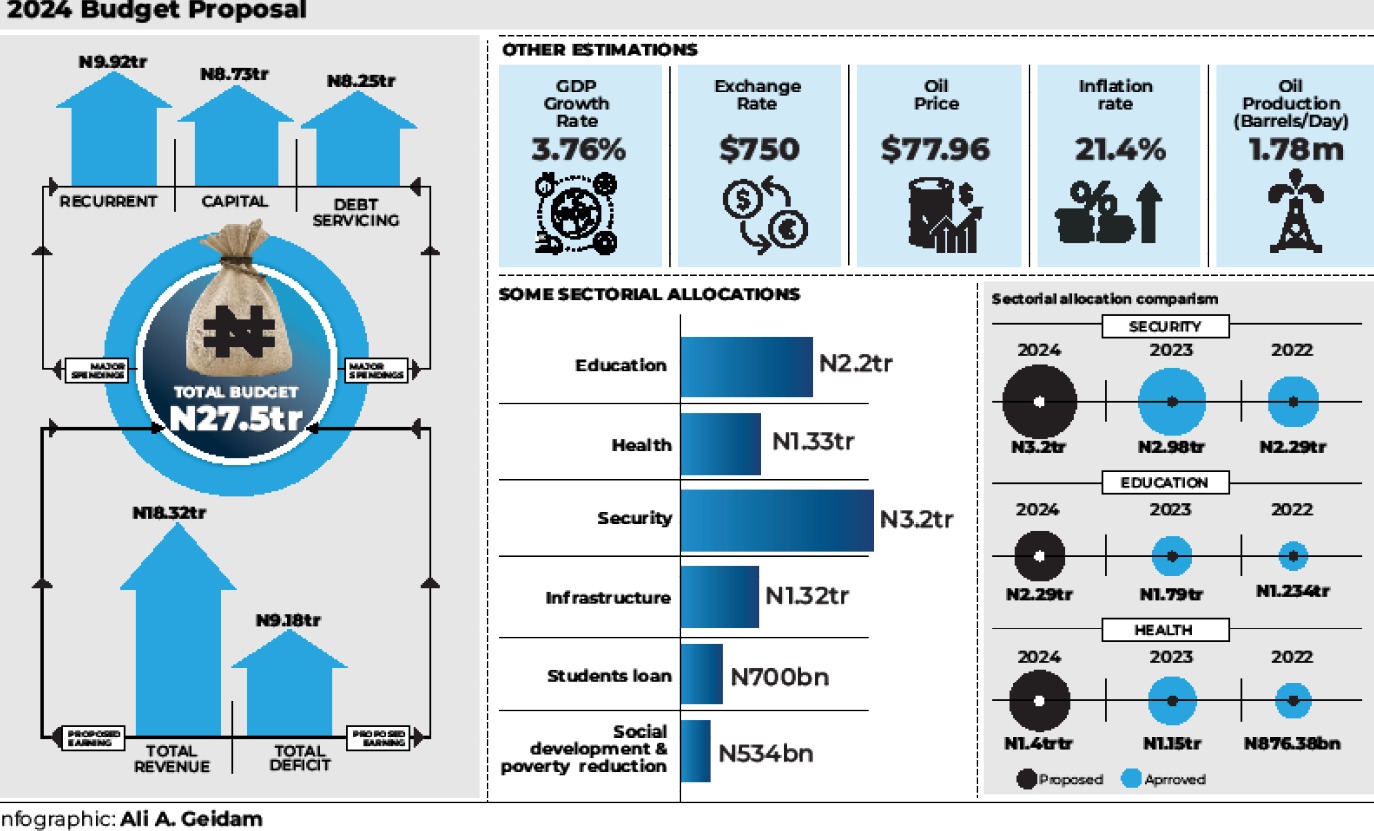 President Bola Tinubu on Wednesday presented the N27.5 trillion budget estimates for the 2024 fiscal year to a joint session of the National Assembly for consideration and approval.
President Bola Tinubu on Wednesday presented the N27.5 trillion budget estimates for the 2024 fiscal year to a joint session of the National Assembly for consideration and approval.
The fiscal document was tagged “Budget of Renewed Hope’’.
The estimate is N2.7 trillion higher than the 2023 budget of N24.82 trillion.
The budget proposal is predicated on N750 per dollar exchange rate; an oil benchmark of $77.96 barrel per day; an oil production volume of 1.78 million per day; a GDP growth rate of 3.76 per cent; and an inflation rate of 21.4 per cent.
Palestinian boys undergo life-saving surgery in the US; Israeli airstrike kills them in their Gaza home
INEC office ‘invaded’ in Kogi as APC, SDP trade blame
It has a total aggregate revenue projection of N18.32 trillion and a deficit of N9.18 trillion (3.88 per cent of GDP).
This is lower than the N13.78 trillion deficit recorded in 2023, which represents 6.11 per cent of GDP.
Tinubu said the 2024 budget deficit will be financed by new borrowings totalling N7.83 trillion, N298.49 billion from privatisation proceeds and N1.05 trillion drawdown on multilateral and bilateral loans secured for specific development projects.
Budget highlights
The Minister of Budget and Economic Planning, Atiku Bagudu, while releasing the breakdown of the budget later yesterday, said out of the N27.5trn aggregate expenditure, N8.7trn would be spent on capital projects.
From N18.51 trillion recurrent expenditure, N10.26 trillion would be on non-debt recurrent expenditure; while N8.25tr would go to debt servicing and N234bn on sinking funds for maturing bonds.
The minister added that a total of N6.48 trillion was provided for personnel and pension costs.
Non-oil revenue
Bagudu said of the aggregate revenue of N18.32 trillion, N7.94 trillion or 43.3% was projected to come from oil-related sources; while the balance of N10.39 trillion was to be earned from non-oil sources.
He said the share of non-oil tax was projected at N3.52 trillion compared to N2.43 trillion in 2023.
Security gets highest sectoral allocation
The breakdown of the budget estimates showed that the defence and security sector received the highest allocation of N3.25 trillion, which is about 12 per cent of the budget.
This is followed by education, which got N2.2trn (7.9 per cent); the health sector, N1.4 trillion (5 per cent) and infrastructure, N1.32trn (5 per cent).
Comparison with 2021, 2022, 2023 sectoral allocations
In 2023, the defence and security sector had the highest vote of N2.74 trillion (13 per cent of the total budget); education, N2.05 trillion (10 per cent) and health, N1.58 trillion (eight per cent).
In 2022, the budget for defence and security in 2022 was N2.41tn; the education sector was allocated N1.29 trillion in 2022 representing 7.9 per cent of the total budget. The entire federal allocation to health in 2022 was N811.2 billion, including funding for vaccines and basic healthcare trust funds.
The 2021 budget for the Ministry of Defence was put at N840.56 billion with another N121 billion earmarked for capital projects. In 2021, the ministries of education and health got N545.10 and N380.21 billion respectively.
Observers noted that the official devaluation of the naira had made issues more complicated this time around.
Presenting the budget yesterday, President Tinubu said its main focus was on national defence, internal security, local job creation, macro-economic stability, human capital development, poverty reduction and social security.
He said the nation’s internal security architecture would be overhauled to enhance law enforcement capabilities with a view to safeguarding lives, property and investments across the country.
He said that the budget prioritised human capital development, with particular attention given to children because human capital remains the most critical resource for national development.
“To improve the effectiveness of our budget performance, the government will focus on ensuring value for money, greater transparency and accountability. In this regard, we will work more closely with development partners and the private sector.
“To address long-standing issues in the education sector, a more sustainable model of funding tertiary education will be implemented, including the Student Loan Scheme scheduled to become operational by January 2024,” the president said.
On the economy, Tinubu said a stable macro-economic environment was crucial in his administration’s bid to catalyse private investment and accelerate economic growth.
“We expect the economy to grow by a minimum of 3.76 per cent, above the forecasted world average. Inflation is expected to moderate to 21.4 per cent in 2024. ‘’In preparing the 2024 budget, our primary objective has been to sustain our robust foundation for sustainable economic development,” he said.
Tinubu wants budget passed in one month
Tinubu appealed to the lawmakers to pass the budget within a month to sustain the January-December budget calendar, started by the last administration.
“As you consider the 2024 budget estimates, we trust that the legislative review process will be conducted with a view to sustaining our desired return to a predictable January-December fiscal year,” Tinubu said.
Responding, the senate president said the lawmakers will, today and tomorrow (Thursday and Friday), consider the 2024 budget for first and second readings and then adjourn the plenary till December 12 for budget defence with MDAs.
Akpabio told President Tinubu not to allow his cabinet members to travel when they are expected to defend the 2024 budget at the National Assembly.
N87trn debt worrying, reduce it – Akpabio
Senate President Godswill Akpabio has urged the federal government to do all within its power to reduce the country’s high debt profile, which stood at N87.38 trillion as of June 2023, according to the Debt Management Office (DMO).
Akpabio’s call came 24 hours after President Tinubu sought the Senate’s approval to borrow $8,699,168,559 and €100 million (N7 trillion) to execute critical projects across the country.
When the new borrowing is added to the existing total public debt of N87.37trn, the country’s debt profile will rise to over N94 trillion.
Akpabio, in his speech at the budget presentation, said though Tinubu’s government inherited a worrisome burden, it has become necessary for the government to reduce the rising debt profile.
He said, “We also want to plead with the government to do all within its power to reduce our high debt profile. We know that Mr President inherited this worrisome burden. But then the mark of a great leader is that he fixes problems wherever they exist.”
Past budgets failed to meet expectations – Speaker
Speaker of the House of Representatives, Tajudeen Abbas, says budgets have not met expectations of improved service delivery and development.
Tajudeen said: “Although the government budget is an important tool for economic management and promoting growth and development, it has generally not met the expectations of improved service delivery and development. This has largely been due to challenges relating to budget enactment, budget implementation, and budget oversight.
“The well-known gaps in the various stages of the budget process underscore the need for budget reforms, including altering relevant sections of the Constitution and existing laws to strengthen the budget process and transform our budget into an authentic tool for development.
“For this reason, I propose enacting a Budget Act to strengthen the budget process and promote development outcomes. This is a well-established practice in democracies across the world.”
Proposals will plunge Nigerians into economic depression – PDP
The Peoples Democratic Party (PDP) has described the N27.5 trillion budget for the 2024 fiscal year as deceitful and asked the National Assembly not to approve it as presented.
The PDP, in a statement by its National Publicity Secretary, Debo Ologunagba, on Wednesday said if the budget is allowed to pass, it will further plunge the nation into more economic depression and hopelessness.
“The PDP calls on the National Assembly pursuant to its Constitutional duty under Sections 80, 81 and 82 of the 1999 Constitution to reject the 2024 budget as presented and use its legislative powers to disassemble the budget and make provisions that are critical and pivotal to the growth of the economy and the welfare of Nigerians,” the party said.
